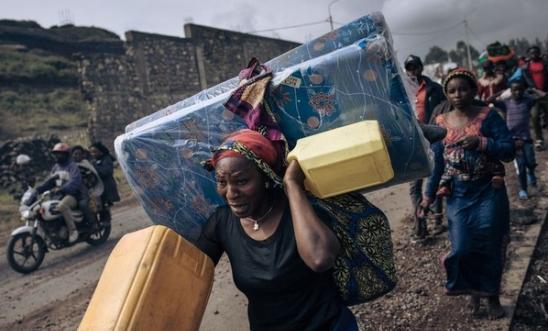
Press releases
DR Congo: Authorities must investigate war crimes amid withdrawal of Rwandan-backed M23 rebels

In response to reports that the March 23 Movement (M23) armed group has withdrawn from several areas of the Democratic Republic of Congo’s North-Kivu province, including the towns of Kishishe, Bambo and Bugina, Agnès Callamard, Amnesty International’s Secretary General, said:
“Authorities in the Democratic Republic of Congo, and the United Nations, must promptly send investigators to the areas vacated by M23 to carry out thorough investigations into credible allegations of mass rapes and summary killings, to ensure those responsible are brought to justice. This should include all those in the line of command and any countries that may have supported M23.
“The DRC authorities must ensure that civilians in the area are protected and humanitarian agencies must urgently step in and provide medical and other assistance to the survivors of rape and other victims of violations and crimes who have been left without help for months.
“While M23 rebels may have withdrawn from some areas in North-Kivu province, civilians living in the Beni area, and neighboring Ituri province, continue to be killed by members of the Allied Democratic Forces and other armed groups. The DRC authorities must take urgent measures to stop the killing of civilians in these areas.”
War crimes
In February, Amnesty issued a press release in which witnesses from the towns of Kishishe, Bambo Centre, and Bugina described how M23 fighters, which UN reports say are backed by neighboring Rwanda, committed war crimes and possible crimes against humanity. Rape survivors, and others who were attacked, have yet to receive adequate assistance.
Rwandan-backed rebel group
M23 is the latest in a succession of Rwandan-backed rebel groups that claim to defend the rights of the Congolese Tutsi community. Launched in 2012 by insurgents from the Congolese army with support from Rwandan and Ugandan authorities according to the UN, the group was militarily defeated in 2013. It re-emerged in November 2021, and very quickly took control of large parts of North Kivu province, committing serious human rights violations in the process and forcing more than 800,000 people to flee their homes.
The group accuses Congolese authorities of persistently failing to dismantle Rwandan Hutu rebels established in eastern DRC in the aftermath of the 1994 genocide in Rwanda, as well as other armed groups posing a threat to Congolese Tutsi and hindering the return of thousands of them who are refugees in Rwanda.
Through the East African Community’s Nairobi Process and the International Conference for the Great Lakes’ Luanda Process, regional leaders have urged all armed groups, including M23, to demobilise and resolve their grievances with the DRC authorities through dialogue. As a result, in January this year, M23 started withdrawing from certain areas, while still fighting in others. Over the last month M23 seems to have halted its offensive and to have vacated several areas it had occupied, allowing the reopening of key roads and the gradual return of internally displaced people.